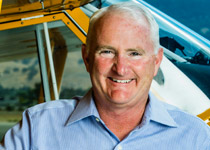President's Position: Putting it in perspective
Why we need to be inside the beltway—and across the country
 When you hear the word “Congress,” a lot of adjectives pop into your head—some of them flattering, others less so. Many Americans, myself included, have strong feelings about our form of government and the men and women we elect. Politics today is divisive, but it’s my job to work with elected representatives from every corner of the country to ensure that general aviation is protected and find ways to help it grow.
When you hear the word “Congress,” a lot of adjectives pop into your head—some of them flattering, others less so. Many Americans, myself included, have strong feelings about our form of government and the men and women we elect. Politics today is divisive, but it’s my job to work with elected representatives from every corner of the country to ensure that general aviation is protected and find ways to help it grow.
Congress has a lot of responsibilities, and there are hundreds, even thousands, of issues competing for the attention of lawmakers every day. That’s one reason it’s so important to stay in close contact with elected officials and ensure general aviation issues are kept front and center.
In many ways, working with members of Congress is like working with anyone else. If you want to be heard, you also need to listen. Mutual respect and honesty are vital in any working relationship, and working with Congress is no different.
You probably already know how I spend summer weekends—flying to great GA airports from Indianapolis to Fort Collins, Colorado; Plymouth, Massachusetts; Oshkosh; Wichita; and Afton, Wyoming. Key West, Florida; Anoka, Minnesota; and more. But to give you an idea of how I spend my time inside the beltway, I’d like to tell you about a few things I’ve done in Washington, D.C., this summer.
When the House Aviation Subcommittee invited me to testify at a hearing on airport financing, I was eager to talk about how important Airport Improvement Program funds are to GA airports (see “Member News and Notes,” page 136). It was also an opportunity to remind lawmakers of the critical role GA airports play, linking rural communities and providing disaster relief, law enforcement, medical, charitable, and business services.
The same week, the House General Aviation Caucus held a briefing where I had the chance to talk about the importance of third class medical reform. This is one of the top issues for AOPA members, and our elected officials need to know just how much it matters to pilots.
Hearings and briefings like these are vitally important, but they aren’t the only way to work with D.C. decision makers to create a more positive environment for GA. I also spend a fair amount of time in one-on-one meetings with members of Congress and the leaders of key government agencies.
During those same few weeks of summer, I met with Sen. John Thune (R-S.D.), the top Republican on the Senate Commerce, Science, and Transportation Committee—as well as Sen. Kelly Ayotte (R-N.H.), the top Republican on the Senate Aviation Subcommittee. I also had meetings with Sen. Bill Nelson (D-Fla.), who is poised to serve as the top Democrat on the Senate Commerce Committee next year, and Sen. Jerry Moran (R-Kan.), a member of the Senate Transportation Appropriations Subcommittee. These are lawmakers who recognize the importance of aviation to their states and who hold positions of influence when it comes to decisions that affect how we fly.
Members of Congress aren’t the only people in Washington who make decisions affecting GA. That’s why I have also recently met with FAA Administrator Michael Huerta, Transportation Secretary Anthony Foxx, Customs and Border Protection Commissioner Gil Kerlikowske, and Department of Homeland Security Secretary Jeh Johnson.
These face-to-face encounters are critical because they create the kind of back-and-forth needed to make progress on important issues. Each meeting is a chance to share the general aviation perspective and talk about what we, as GA operators, need to function safely, efficiently, and freely as part of the national transportation system.
I know there are those who think we spend too much time in Washington, D.C., but the truth is that no advocacy organization can be effective without a strong presence inside the beltway. It’s equally true that there’s value in stepping outside the world of politics and regulation to get perspective on what’s really going on.
I think we have the right balance of both at AOPA. Our headquarters is outside the beltway and we spend lots of time meeting with members across the country, getting to know their points of view and understand what matters most to pilots. Then there’s the work we do in the states with the help of our state legislative affairs team and regional managers. But we also keep an office inside D.C., making it easier to build and maintain the relationships that let us get things done at the federal level. And, in the end, that’s what we’re here for—to represent you and your needs to the people with the responsibility to make things happen.
AOPA President Mark Baker is an avid seaplane pilot and owns a Beech 18 and a Super Cub on floats.
Email [email protected]


